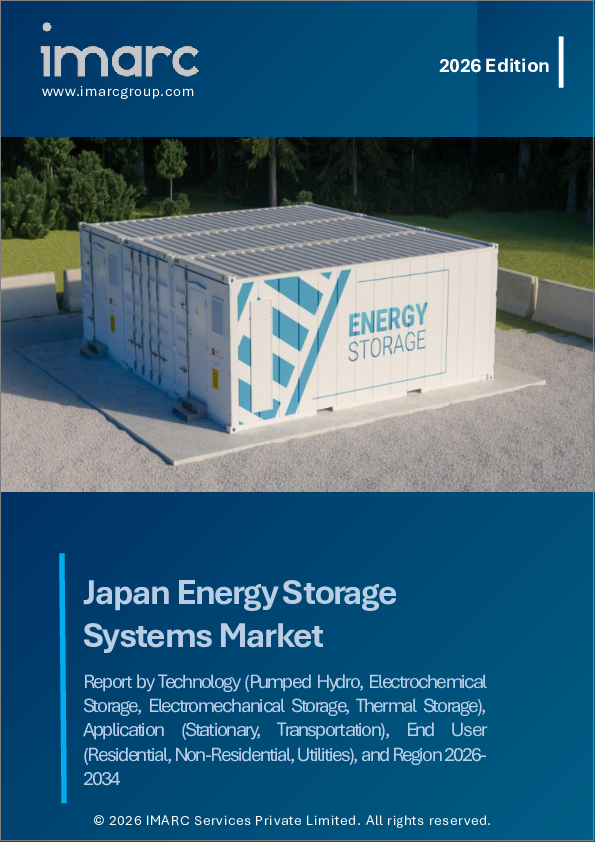|
|
市場調査レポート
商品コード
1905501
日本のエネルギー貯蔵システム市場レポート:技術別、用途別、エンドユーザー別、地域別2026-2034年Japan Energy Storage Systems Market Report by Technology, Application, End User, and Region 2026-2034 |
||||||
カスタマイズ可能
|
|||||||
| 日本のエネルギー貯蔵システム市場レポート:技術別、用途別、エンドユーザー別、地域別2026-2034年 |
|
出版日: 2026年01月01日
発行: IMARC
ページ情報: 英文 118 Pages
納期: 5~7営業日
|
概要
日本のエネルギー貯蔵システム市場規模は、2025年に16.2ギガワットに達しました。同市場は2034年までに30.4ギガワットに達すると予測されており、2026年から2034年にかけてCAGR7.24%で成長する見込みです。本市場は、緊急停電時の電力需要の高まり、再生可能エネルギー源の導入拡大、有害排出量削減に向けた世界の取り組みなど、いくつかの重要な要因によって推進されています。
本レポートで回答する主な質問
- 1.日本におけるエネルギー貯蔵システム市場の規模はどの程度でしょうか?
- 2.日本のエネルギー貯蔵システム市場の予測はどのようになっていますか?
- 3.日本におけるエネルギー貯蔵システム市場の成長を牽引している要因は何ですか?
目次
第1章 序文
第2章 調査範囲と調査手法
- 調査の目的
- ステークホルダー
- データソース
- 市場推定
- 調査手法
第3章 エグゼクティブサマリー
第4章 日本のエネルギー貯蔵システム市場- イントロダクション
- 概要
- 市場力学
- 業界動向
- 競合情報
第5章 日本のエネルギー貯蔵システム市場概況
- 過去および現在の市場動向(2020-2025年)
- 市場予測(2026-2034年)
第6章 日本のエネルギー貯蔵システム市場- 技術別内訳
- 揚水式水力発電
- 電気化学的蓄電
- 電気機械式蓄電
- 蓄熱
第7章 日本のエネルギー貯蔵システム市場- 用途別内訳
- 据置型
- 交通機関
第8章 日本のエネルギー貯蔵システム市場- エンドユーザー別内訳
- 住宅用
- 非住宅向け
- 電力会社
第9章 日本のエネルギー貯蔵システム市場- 地域別内訳
- 関東地方
- 関西・近畿地方
- 中部地方
- 九州・沖縄地方
- 東北地方
- 中国地方
- 北海道地域
- 四国地方
第10章 日本のエネルギー貯蔵システム市場- 競合情勢
- 概要
- 市場構造
- 市場企業のポジショニング
- 主要成功戦略
- 競合ダッシュボード
- 企業評価クアドラント
第11章 主要企業のプロファイル
第12章 日本のエネルギー貯蔵システム市場- 業界分析
- 促進要因・抑制要因・機会
- ポーターのファイブフォース分析
- バリューチェーン分析






